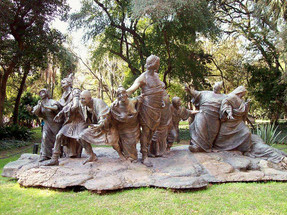Posted by The Wizard's Hat on Dec 23rd 2024
We are in the middle of the celebration of Saturnalia
We are in the middle of the celebration of Saturnalia...
We are in the middle of the celebration of Saturnalia; both the Winter Solstice & Yule are/start on the 21st. So join us as we celebrate these special Pagan Occasions.
Saturnalia
Although probably the best-known Roman holiday, Saturnalia as a whole is not described from beginning to end in any single ancient source. Modern understanding of the festival is pieced together from several accounts dealing with various aspects. The Saturnalia was the dramatic setting of the multivolume work of that name by Macrobius, a Latin writer from late antiquity who is the major source for information about the holiday. Macrobius describes the reign of Justinus' "king Saturn" as "a time of great happiness, both on account of the universal plenty that prevailed and because as yet there was no division into bond and free – as one may gather from the complete license enjoyed by slaves at the Saturnalia."[8] In Lucian's Saturnalia it is Chronos himself who proclaims a "festive season, when 'tis lawful to be drunken, and slaves have license to revile their lords". In one of the interpretations in Macrobius's work, Saturnalia is a festival of light leading to the winter solstice, with the abundant presence of candles symbolizing the quest for knowledge and truth. The renewal of light and the coming of the new year was celebrated in the later Roman Empire at the Dies Natalis Solis Invicti, the "Birthday of the Unconquerable Sun", on 23 December. The popularity of Saturnalia continued into the 3rd and 4th centuries AD, and as the Roman Empire came under Christian rule, many of its customs were recast into or at least influenced the seasonal celebrations surrounding Christmas and the New Year.
Saturnalia was an ancient Roman festival and holiday in honor of the god Saturn, held on 17 December of the Julian calendar and later expanded with festivities through to 23 December. The holiday was celebrated with a sacrifice at the Temple of Saturn, in the Roman Forum, and a public banquet, followed by private gift-giving, continual partying, and a carnival atmosphere that overturned Roman social norms: gambling was permitted, and masters provided table service for their slaves as it was seen as a time of liberty for both slaves and freedmen alike. A common custom was the election of a "King of the Saturnalia", who would give orders to people, which were to be followed and preside over the merrymaking. The gifts exchanged were usually gag gifts or small figurines made of wax or pottery known as sigillaria. The poet Catullus called it "the best of days". Saturnalia was the Roman equivalent to the earlier Greek holiday of Kronia, which was celebrated during the Attic month of Hekatombaion in late midsummer. It held theological importance for some Romans, who saw it as a restoration of the ancient Golden Age, when the world was ruled by Saturn.
The Neoplatonist philosopher Porphyry interpreted the freedom associated with Saturnalia as symbolizing the "freeing of souls into immortality". Saturnalia may have influenced some of the customs associated with later celebrations in western Europe occurring in midwinter, particularly traditions associated with Christmas, the Feast of the Holy Innocents, and Epiphany. In particular, the historical western European Christmas custom of electing a "Lord of Misrule" may have its roots in Saturnalia celebrations.
In Roman mythology, Saturn was an agricultural deity who was said to have reigned over the world in the Golden Age, when humans enjoyed the spontaneous bounty of the earth without labor in a state of innocence. The revelries of Saturnalia were supposed to reflect the conditions of the lost mythical age. The Greek equivalent was the Kronia, which was celebrated on the twelfth day of the month of Hekatombaion, which occurred from around mid-July to mid-August on the Attic calendar.
The Kronia (Ancient Greek: Κρόνια) was an Athenian festival held in honor of Cronus (Kronos). The Greek writer Athenaeus also cites numerous other examples of similar festivals celebrated throughout the Greco-Roman world, including the Cretan festival of Hermaia in honor of Hermes, an unnamed festival from Troezen in honor of Poseidon, the Thessalian festival of Peloria in honor of Zeus Pelorios, and an unnamed festival from Babylon. He also mentions that the custom of masters dining with their slaves was associated with the Athenian festival of Anthesteria and the Spartan festival of Hyacinthia. The Argive festival of Hybristica, though not directly related to the Saturnalia, involved a similar reversal of roles in which women would dress as men and men would dress as women. The ancient Roman historian Justinus credits Saturn with being a historical king of the pre-Roman inhabitants of Italy.
The first inhabitants of Italy were the Aborigines, whose king, Saturnus, is said to have been a man of such extraordinary justice, that no one was a slave in his reign, or had any private property, but all things were common to all, and undivided, as one estate for the use of every one; in memory of which way of life, it has been ordered that at the Saturnalia slaves should everywhere sit down with their masters at the entertainments, the rank of all being made equal." — Justinus, Epitome of Pompeius Trogus
Saturnalia was characterized by role reversals and behavioral license. Slaves were treated to a banquet of the kind usually enjoyed by their masters. Ancient sources differ on the circumstances: some suggest that master and slave dined together,] while others indicate that the slaves feasted first, or that the masters actually served the food. The practice might have varied over time.
The toga, the characteristic garment of the male Roman citizen, was set aside in favor of the Greek synthesis, colorful "dinner clothes" otherwise considered in poor taste for daytime wear. Romans of citizen status normally went about bare-headed, but for the Saturnalia donned the pilleus, the conical felt cap that was the usual mark of a freedman. Slaves, who ordinarily were not entitled to wear the pilleus, wore it as well, so that everyone was "pilleated" without distinction.
The participation of freeborn Roman women is implied by sources that name gifts for women, but their presence at banquets may have depended on the custom of their time; from the late Republic onward, women mingled socially with men more freely than they had in earlier times. Female entertainers were certainly present at some otherwise all-male gatherings. Role-playing was implicit in the Saturnalia's status reversals, and there are hints of mask-wearing or "guising". No theatrical events are mentioned in connection with the festivities, but the classicist Erich Segal saw Roman comedy, with its cast of impudent, free-wheeling slaves and libertine seniors, as imbued with the Saturnalian spirit.
Gift-giving
Sigillaria (ancient Rome)
The Sigillaria on 19 December was a day of gift-giving. Because gifts of value would mark social status contrary to the spirit of the season, these were often the pottery or wax figurines called sigillaria made specially for the day, candles, or "gag gifts", of which Augustus was particularly fond. Children received toys as gifts. In his many poems about the Saturnalia, Martial names both expensive and quite cheap gifts, including writing tablets, dice, knucklebones, moneyboxes, combs, toothpicks, a hat, a hunting knife, an axe, various lamps, balls, perfumes, pipes, a pig, a sausage, a parrot, tables, cups, spoons, items of clothing, statues, masks, books, and pets. Gifts might be as costly as a slave or exotic animal, but Martial suggests that token gifts of low intrinsic value inversely measure the high quality of a friendship. Patrons or "bosses" might pass along a gratuity (sigillaricium) to their poorer clients or dependents to help them buy gifts. Some emperors were noted for their devoted observance of the Sigillaria.
In a practice that might be compared to modern greeting cards, verses sometimes accompanied the gifts. Martial has a collection of poems written as if to be attached to gifts. Catullus received a book of bad poems by "the worst poet of all time" as a joke from a friend.
Gift-giving was not confined to the day of the Sigillaria. In some households, guests and family members received gifts after the feast in which slaves had shared.
In Observance:
As an observance of state religion, Saturnalia was supposed to have been held ante diem xvi Kalendas Ianuarias, sixteen days before the Kalends of January, on the oldest Roman religious calendar, which the Romans believed to have been established by the legendary founder Romulus and his successor Numa Pompilius. It was a dies festus, a legal holiday when no public business could be conducted. The day marked the dedication anniversary (dies natalis) of the Temple to Saturn in the Roman Forum in 497 BC. When Julius Caesar had the calendar reformed because it had fallen out of synchronization with the solar year, two days were added to the month, and Saturnalia fell on 17 December. It was felt, however, that the original day had thus been moved by two days, and so Saturnalia was celebrated under Augustus as a three-day official holiday encompassing both dates.
By the late Republic, the private festivities of Saturnalia had expanded to seven days, but during the Imperial period contracted variously to three to five days. Caligula extended official observances to five.
The date 17 December was the first day of the astrological sign Capricorn, the house of Saturn, the planet named for the god. Its proximity to the winter solstice (21 to 23 December on the Julian calendar) was endowed with various meanings by both ancient and modern scholars: for instance, the widespread use of wax candles (cerei, singular cereus) could refer to "the returning power of the sun's light after the solstice".
-Credit: Wikipedia Saturnalia (1909) by Ernesto Biondi, in the Buenos Aires Botanical Gardens


